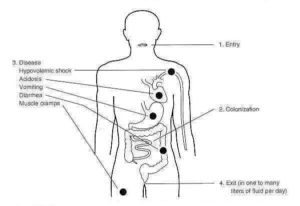 NY Times Opinion: A United Nations report on the cholera outbreak that has sickened 300,000 Haitians since last fall, killing nearly 5,000, finds evidence to suggest that the disease may have originated at a United Nations military camp north of the capital, which spilled raw sewage into a tributary of the Artibonite River. The epidemic was able to spread so far only because of the chronic and horrible deficiencies in Haiti’s sanitation and health care systems, which long predate the 2010 earthquake.
NY Times Opinion: A United Nations report on the cholera outbreak that has sickened 300,000 Haitians since last fall, killing nearly 5,000, finds evidence to suggest that the disease may have originated at a United Nations military camp north of the capital, which spilled raw sewage into a tributary of the Artibonite River. The epidemic was able to spread so far only because of the chronic and horrible deficiencies in Haiti’s sanitation and health care systems, which long predate the 2010 earthquake.
The fact that the disease is still spreading is a reminder of how much more help Haiti needs and the consequences of continued neglect.
Technically, the challenge of containing the epidemic is simple enough. Haitians need clean water for drinking and washing. They need soap and bleach and access to medical care for rehydration when they fall ill. They need safe ways to dispose of sewage and shelter for when the rains worsen and cause streets and rivers to flood and cholera cases to spike.
For too many, the ingredients of tragedy remain stubbornly in place. Even as relief agencies are winding down their presence in Haiti, about 680,000 people are still living in camps and waiting for permanent shelter. Life in this setting is precarious, without adequate access to latrines and safe drinking water.
The United Nations’ overall appeal to respond to the epidemic, for $175 million, is 48 percent financed. Haiti’s continuing health emergency may have been overlooked in a crush of world events, but while the sick and dying are waiting for the world to respond, the disease is not.
——————————————————————————————————————————–
COMMENT: HAITIAN-TRUTH.ORG
They only admit to 5,000 deaths but, with regard to mortality rates and cholera, the figure must be much higher as a Google Search shows.
Out-of-sight-Out-of-mind
Many of those who contract cholera will never be seen by a foreigner….dying a lonely death somewhere in the countryside. Many deaths remain outside of the studied area of Haiti.